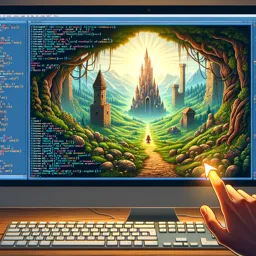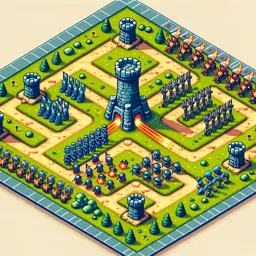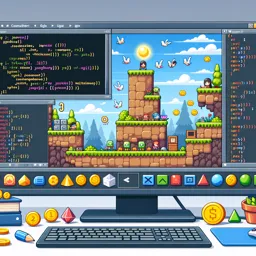Enroll in the free Complete Game Programming Course with Unity. Learn game development from start to finish and earn a free certification! Register now!
Course content
Introduction to Unity
2Setting up the development environment
3Understanding the Unity interface
4Creating your first project in Unity
5Import and asset management
6Creation of terrain and environments
73D Modeling in Unity
8Texturing and materials
9Lighting and shadows
10Particle system
11Animation and cinematics
12Introduction to programming in C#
13Variables, constants and operators in C#
14Control structures in C#
15Functions and procedures in C#
16Object Orientation in C#
17Object Orientation in C#: Object Orientation Concept
18Object Orientation in C#: Classes and Objects in C#
19Object Orientation in C#: Inheritance and Polymorphism
20Object Orientation in C#: Encapsulation
21Object Orientation in C#: Abstraction
22Object Orientation in C#: Interfaces
23Object Orientation in C#: Constructors and Destructors
24Object Orientation in C#: Methods and Properties
25Object Orientation in C#: Method Overloading
26Object Orientation in C#: Attributes and Static Methods
27Object Orientation in C#: Exception Handling
28Object Orientation in C#: Collections in C#
29Object Orientation in C#: Delegates and Events
30Game Script Programming
31Manipulating user input
32AI Programming for NPCs
33Creating user interfaces
34Scoring system and data storage
35Audio programming and sound effects
36Physics and collisions in Unity
37Multiplayer Game Programming
38Game optimization for better performance
39Game Testing and Debugging
40Publishing games to the Unity Store
41Publishing games in app stores
42Marketing Strategy for Digital Games
43Game monetization with ads and in-app purchases
44Copyright and legal issues
45Best Practices for Game Development
46Introduction to Virtual Reality (VR) with Unity
47Introduction to Augmented Reality (AR) with Unity
48Course completion and next steps
Course Description
Welcome to the "Complete Game Programming Course with Unity," an all-encompassing resource designed for aspiring game developers. This course is housed within the Information Technology category and falls under the Game Development subcategory. Over the span of 48 pages, you will be guided through a structured learning journey that begins with the very basics and extends into advanced game development techniques and best practices.
Your journey starts with an introduction to Unity, one of the most powerful and widely-used game development platforms. The course will help you set up the development environment, ensuring that you have all the necessary tools to get started. Following this, you will gain a deep understanding of the Unity interface, which is crucial for efficient navigation and project management.
Once you're comfortable with the interface, you'll move on to creating your first project in Unity. This module covers everything from project setup to implementing your initial game mechanics. Next, you'll delve into asset management, learning how to import and manage the various resources needed for your game, whether they be textures, models, or audio files.
The course then transitions into environmental creation, guiding you through terrain modeling and the intricate art of 3D modeling within Unity. Texturing and materials will be explored in detail, allowing you to add realism and depth to your game environments. Lighting and shadows are equally essential, and you’ll learn how to create stunning visuals that enhance the player’s experience.
In the mid-section of the course, animation and the particle system will be your focus. These components are crucial for bringing your game characters and environments to life. You'll also be introduced to programming in C#, which is the backbone of scripting in Unity. Fundamental programming concepts such as variables, constants, operators, control structures, and functions will be covered thoroughly.
One of the course's standout features is its comprehensive coverage of Object-Oriented Programming (OOP) in C#. You'll explore concepts like classes and objects, inheritance, polymorphism, encapsulation, and more. Understanding these principles will allow you to create more organized and scalable code, which is essential for complex game development.
Further into the course, you’ll tackle game script programming, user input manipulation, and AI programming for non-player characters (NPCs). Creating an engaging user interface will be emphasized, along with implementing a scoring system and data storage solutions. Sound plays a pivotal role in gaming, and you’ll learn about audio programming and sound effects.
Advanced topics include physics and collision detection, multiplayer game programming, and optimizing your game for better performance. Testing and debugging will ensure that your game runs smoothly, and you’ll learn the steps for publishing your creations to the Unity Store and various app stores. Marketing strategies, monetization techniques, and understanding copyright and legal issues are also covered to prepare you for the business side of game development.
The course wraps up with best practices for game development, and exciting introductions to Virtual Reality (VR) and Augmented Reality (AR) with Unity. Finally, you will complete the course with a module on future steps, ensuring you are ready to tackle more advanced projects and pursue a successful career in game development.
This free course includes:
2 hours and 43 minutes of audio content
Digital certificate of course completion (Free)
Exercises to train your knowledge
100% free, from content to certificate
Ready to get started?
In the app you will also find...
Over 5,000 free courses
Programming, English, Digital Marketing and much more! Learn whatever you want, for free.
Study plan with AI
Our app's Artificial Intelligence can create a study schedule for the course you choose.
From zero to professional success
Improve your resume with our free Certificate and then use our Artificial Intelligence to find your dream job.
You can also use the QR Code or the links below.



























